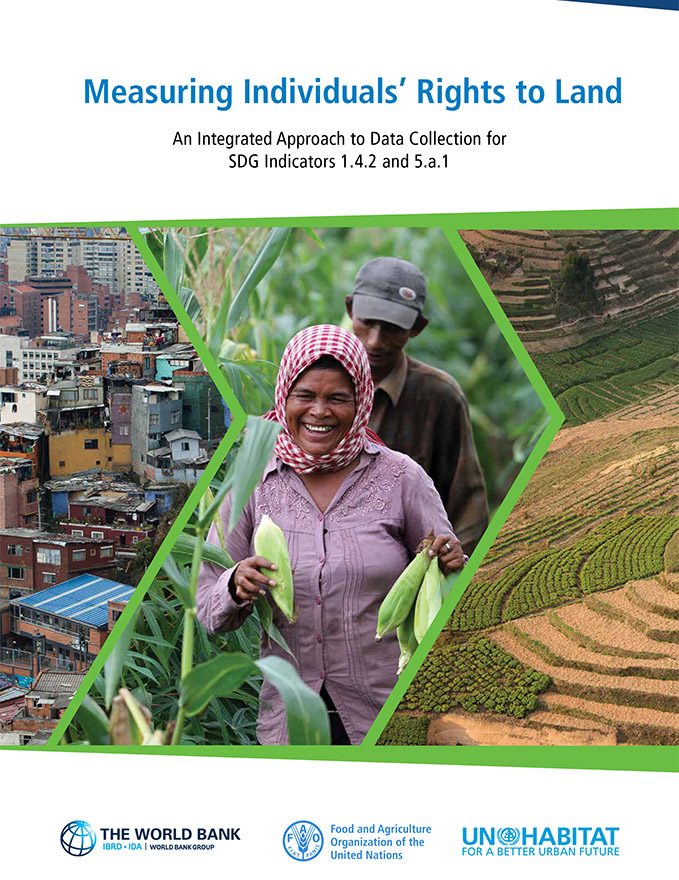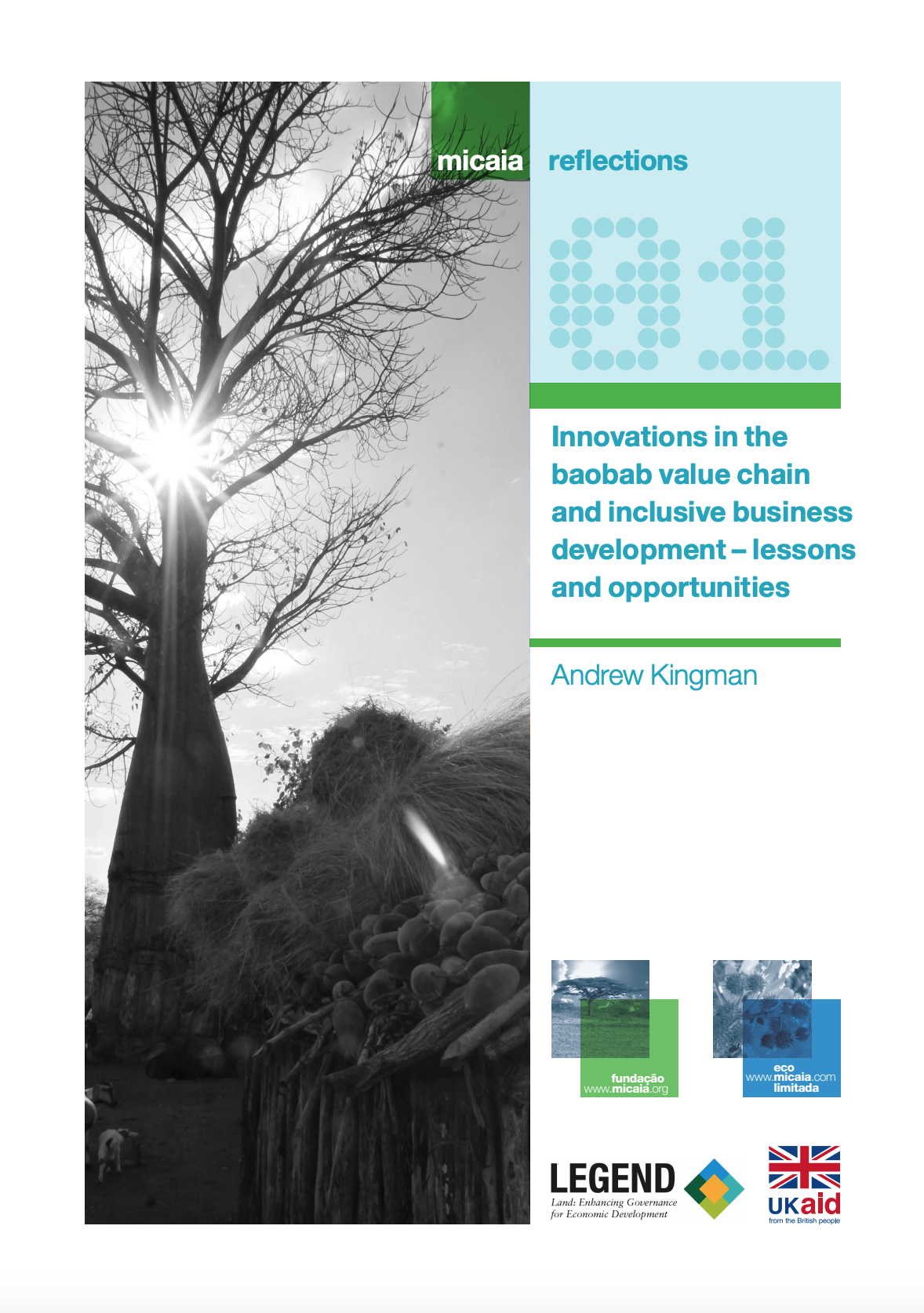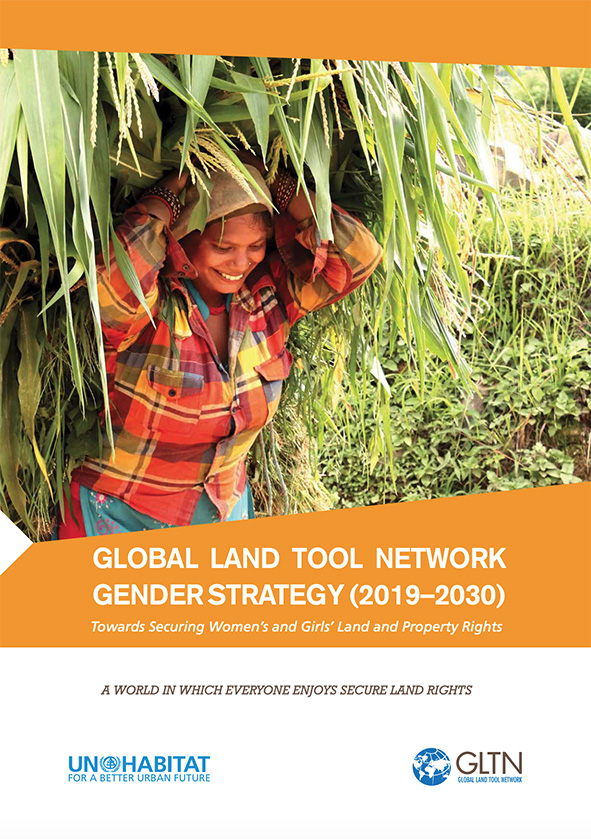women
AGROVOC URI: http://aims.fao.org/aos/agrovoc/c_8420
Obligations Under International Treaties and Conventions
This guidance aims to provide companies with an overview of the links between land and human rights enshrined in these agreements and in official statements issued by treaty monitoring bodies. While it focuses on Ghana with a non-exhaustive examination its human rights obligations with an overview of the most significant agreements pertaining to land-based investments, it will be useful for companies working in other countries because the agreements presented have been ratified and signed by a large number of countries.
Measuring Individuals’ Rights to Land; An Integrated Approach to Data Collection for SDG Indicators 1.4.2 and 5.a.1
Land is a key economic resource inextricably linked to access to, use of and control over other economic and productive resources. Recognition of this, and the increasing stress on land from the world’s growing population and changing climate, has driven demand for strengthening tenure security for all. This has created the need for a core set of land indicators that have national application and global comparability, which culminated in the inclusion of indicators 1.4.2 and 5.a.1 in the Sustainable Development Goals (SDGs) agenda.
Innovations in the baobab value chain and inclusive business development – lessons and opportunities
This reflection paper focuses on the baobab value chain in the north of Manica Province, and specifically on the interactions between women baobab collectors and Baobab Products Mozambique (BPM), as BPM seeks to develop its inclusive business model.
For the last three years, the commercial interactions between BPM and the communities, particularly the women who collect the baobab fruit, have taken place in the context of a LEGEND-funded project implemented by Micaia Foundation. Micaia’s project sought to address two central problems:
Changing Household and Gender Dynamics Resulting From Baobab Business Development
This paper focuses on the baobab value chain in the north of Manica Province, and specifically on the ways in which commercialization of the value chain with Baobab Products Mozambique is beginning to have an impact on the gender dynamics within the households of the women collectors.
Implications of Baobab Value Chain Development for Land and Natural Resource Rights and Governance
This reflection paper focuses on the baobab value chain in the north of Manica Province and, specifically, on the ways in which commercialization of the value chain with Baobab Products Mozambique (BPM) is beginning to have an impact on the governance of land and natural resources, including baobab (Adansonium digitata).
Negotiating and implementing large scale land deals in Sierra Leone
Investment into large-scale agribusiness projects in African post-conflict states is framed within broader economic reforms. On their surface, these projects boast of attracting much-needed infrastructure development, providing employment and shifts from subsistence agriculture to formal wage labor, and raising GDP.
GLTN Gender Strategy (2019–2030): Towards Securing Women’s and Girls’ Land and Property Rights
The GLTN Gender Strategy (2019-2030) provides a framework for designing land tenure and governance interventions around women’s and girls’ land and property rights. It affirms our commitment and motivates our partners to do more to secure land and property rights for women and girls. It underpins the centrality of gender equality in resource sharing and allocation, including land as a productive resource for women and girls.
Differentiations in Women’s Land Tenure Experiences: Implications for Women’s Land Access and Tenure Security in Sub-Saharan Africa
Most literature on land tenure in sub-Saharan Africa has presented women as a homogenous group. This study uses evidence from Ghana, Nigeria, and Zimbabwe to show that women have differentiated problems, needs, and statuses in their quest for land access and tenure security. It illustrates how women-to-women differences influence women’s access to land. By investigating differentiations in women’s land tenure in the three countries, the study identifies multiple and somewhat interlinked ways in which differentiations exist in women’s land tenure. It achieved some key outcomes.
Improving the Socioeconomic Status of Rural Women Associated with Agricultural Land Acquisition: A Case Study in Huong Thuy Town, Thua Thien Hue Province, Vietnam
Since the 2000s, agricultural land acquisition (ALA) for urbanization and industrialization has been quickly implemented in Vietnam, which has led to a huge socioeconomic transformation in rural areas. This paper applies the sustainable livelihoods framework to analyze how ALA has impacted the socioeconomic status (SES) of rural women whose agricultural land was acquired. To get primary data, we surveyed 150 affected households, conducted three group discussions and interviewed nine key informants.
Webinar Report: The Role of Land Certification in Securing Women's Land Rights on Collective Lands
Evidence shows that women can benefit from having individualised land rights formalized in their names. However, similar evidence is not available for formalization of land rights that are based on collective tenure. Studies have estimated that as much as 65 percent of the world’s land is held under customary, collective-tenure systems. Improving tenure security for land held collectively has been shown to improve resource management and to support self-determination of indigenous groups.










